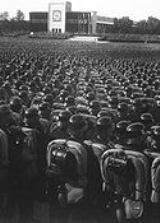Does anyone know "how the twenties should be remembered?"
replied to: tammyf
Replied to: Does anyone know "how the twenties should be remembered?"
The twenties in the usa were yearsw of mass poverty and excessive wealth going hand in hand,Prohibition of alchohol led tom a black market contolled by ganbsters and mobsters who got extremely richmmany paople had to move their belongings from yhr dustbowl states of ocklahoma and the like and travel west lookoing for a better life in california.prohibition brought to fame such figures a sal caponeans it was a great thing taht it ended because it is always the children who suffer cos blackmarket stuff is so expensive;the kids food and clothing is neglected.womans fashion changed a lot in thr twenties-they'd had a taste for loocem fitting overalls in the war industries and french ballet designers put on some incredible shoes all about the middle east with loose fitting garments ans ,famously,harem pants.women were quite open about smoking regardsccserx
replied to: ccserxrgf1961
Replied to: The twenties in the usa were yearsw of mass poverty and...
Hmmm... I'm afraid I must disagree with some of those statements, although I can only speak about life and times within the US. Particularly, there was no "mass poverty" until the stock market crash of 1929. It was a shock and a lot of companies folded, but it would be a year or two before the full effects were felt. The Dust Bowl didn't occur until 1930. There was of course a black market for alcohol - I suspect my own grandfather might have profited from it - but my understanding is, the price to consumers was no more expensive than before. It didn't have to be, in order for a few like Capone to make millions - all the money went through him, in Chicago at least. Elsewhere in the country, there was no shortage of competition - which of course keeps the consumer prices low.
Actually, the 20s are usually remembered as a time of prosperity and liberation. The War to End All Wars was over, as well as the influenza epidemic that killed more people than the War had. Society was changing, many thought for the better. Women enjoyed new respect through the unrestricted right to vote when the Nineteenth Amendment was ratified in 1920. That feeling lasted the whole decade - the presidential election of 1928 was only the second time that all women could cast their ballots.
The 20s were especially good - although of course not universally so - to a number of African American communities. 2 million people migrated out of the south to seek a better life elsewhere. Many found it in places like Harlem, St. Louis, and Chicago. (Many didn't, unfortunately, but it was a time of great hope.)
Technology was developing at an unprecedented rate. Airplanes, radios, electric lights, cars, movies. All of it was new, exciting, and available to the average person.
There was a downside too - the Midwest was home to incredibly violent gangsters armed with machine guns. But for most people, the great risk was robbery, not murder. And just like Robin Hood before them, a certain romance built up around their reputations, especially in areas not directly affected.
The last point I wanted to make about how we remember it is, the memory is greatly influenced by what followed it: a decade of poverty and impending war. (Don't forget, the devastation of the Second World War made the first one look like a schoolyard scrap in retrospect.) It all makes the peace and promise of the 20s seem pretty sweet!

